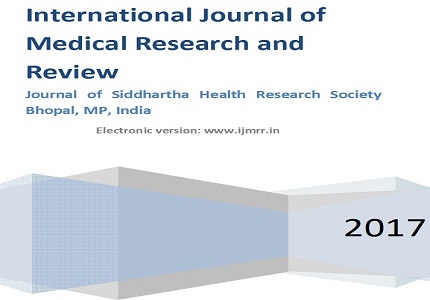Clinical etiological evaluation of Pancytopenia: Experience of tertiary care teaching hospital in central India
Abstract
Introduction: Pancytopenia is a common clinico-hematological entity. There are significant variations in incidence of disorders causing pancytopenia.
Objectives: To evaluate different causes of pancytopenia & to correlate underlying etiology of pancytopenia with clinical profile.
Methods: This prospective observational study was done in the Department of Medicine, Gandhi Medical College & Hamidia Hospital, Bhopal between July 2014 to Nov. 2015. 70 cases of pancytopenia were included. All participants underwent clinical evaluation and baseline investigations followed by bone marrow examination.
Result: Out of 70 patients, 71% were < 40 years and male to female ratio of 1.41:1. Most common presentation was fever and weakness. Most common physical findings were splenomegaly seen in 48 cases. Lymphadenopathy was noted in 6 cases. Megaloblastic anaemia (41.4%) was most common cause of pancytopenia irrespective of age and sex. It was followed by aplastic anaemia, hypersplenism and leukaemia. Together these four accounted for 94.3% cases. In younger patients common causes after megaloblastic anemia (42.9%) were aplastic anemia followed by leukemia, hypersplenism, autoimmunity and infection. In older age group common causes were hypersplenism (23.8%), aplastic anemia, leukemia and infection after megaloblastic anemia. Aplastic anemia was more common in males and hypersplenism in females.
Conclusion: In our study megaloblastic anemia is most common cause of pancytopenia in this part of India irrespective of age and gender. Splenomegaly was more common in megaloblastic anemia, hypersplenism and malignancies. Most of the patients without splenomegaly had aplastic anemia.
Downloads
References
Mc Kenzie Sherlyn B. Textbook of haematology. 2ndedition.baltimore : William and Wilkins; 1996 pp 55-87.
Khunger JM, Arulselvi S, Sharma U, Ranga S, Talib VH. Pancytopenia--a clinico haematological study of 200 cases. Indian J Pathol Microbiol. 2002 Jul;45(3):375-9.
Jain A, Naniwadekar M. An etiological reappraisal of pancytopenia - largest series reported to date from a single tertiary care teaching hospital. BMC Hematol. 2013 Nov 6;13(1):10. doi: https://doi.org/10.1186/2052-1839-13-10.
Tilak V, Jain R. Pancytopenia--a clinico-hematologic analysis of 77 cases. Indian J Pathol Microbiol. 1999 Oct; 42(4):399-404.
Qazi RA, Masood A. Diagnostic evalution of pancytopenia. J rawal med coll, 2002;6 : 30- 33.
Khodke K, Marwah S et al. Bone marrow examination in casesof pancytopenia. JIACM 2001;2: 55-59.
Gamal A H, Ghada A G. Clinical and hematological manifestations of visceral leishmaniasis in Yemeni children. Turk J Hematol2009; 26(1): 25-28.
Aster RH. Pooling of platelets in the spleen: role in the pathogenesis of "hypersplenic" thrombocytopenia. J Clin Invest. 1966 May; 45(5):645-57.
Jandl JH, Aster RH. Increased splenic pooling and the pathogenesis of hypersplenism. Am J Med Sci. 1967 Apr; 253(4):383-98.
Green D, Battifora HA, Smith RT, Rossi EC. Thrombocytopenia in Gaucher's disease.Ann Intern Med. 1971 May; 74(5):727-31.
Johnson HA, Deterling RA. Massive splenomegaly. Surg Gynecol Obstet. 1989 Feb;168(2):131-7.
Sood R, Roy S, Kaushik P. Typhoid fever with severe pancytopenia. Postgrad Med J. 1997 Jan; 73(855):41-2.
Keeling DM, Isenberg DA. Haematological manifestations of systemic lupus erythematosus. Blood Rev. 1993 Dec;7(4):199-207.
Nesher G, Hanna VE, Moore TL, Hersh M, Osborn TG. Thrombotic microangiographic hemolyticanemia in systemic lupus erythematosus. Semin Arthritis Rheum. 1994 Dec;24(3):165-72.



 OAI - Open Archives Initiative
OAI - Open Archives Initiative


